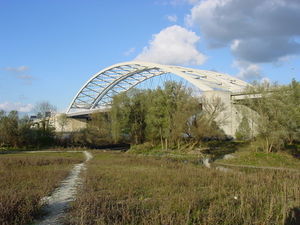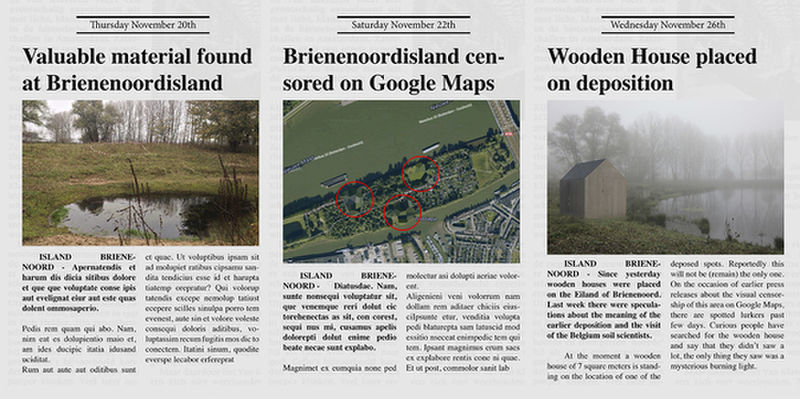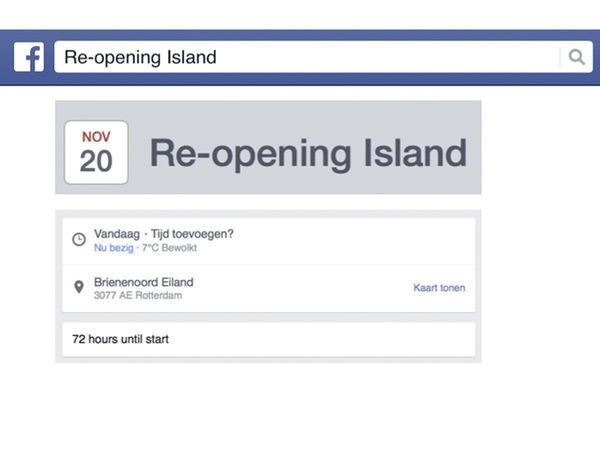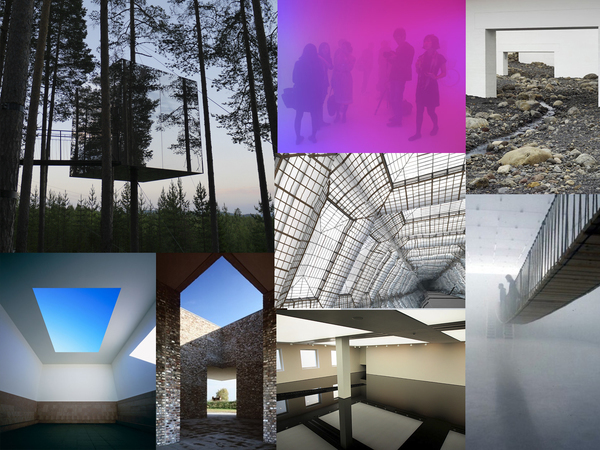Difference between revisions of "Eiland van Brienenoord"
| Line 6: | Line 6: | ||
=== Facilitating the emerging civic economy in Rotterdam === | === Facilitating the emerging civic economy in Rotterdam === | ||
In many cities, we are increasingly witnessing the emergence of new forms of ownership: the consumer society is turning into a civic economy. In recent years in Rotterdam, a number of social initiatives and subsidy-free enterprises have been founded, such as [http://hotspothutspot.nl/ Hotspot Hutspot], [http://www.leeszaalrotterdamwest.nl/ Leeszaal Rotterdam West] and [http://www.sweatshopdeluxe.com/shop Sweatshop Deluxe]. Neighborhood initiatives like [https://www.facebook.com/zorgvrijstaat Zorgvrijstaat Rotterdam West], strive for more autonomy from citizens; they want to make people aware, activate and guide people in creating a network to solve their own problems. Their focus is on solving social issues through social, cultural and artistic interventions. Wouldn't it be nice if these initiatives could take some distance from their field of work, live in a different environment with different disciplines in order to reflect, gain new insights and develop their competences every once in a while? | In many cities, we are increasingly witnessing the emergence of new forms of ownership: the consumer society is turning into a civic economy. In recent years in Rotterdam, a number of social initiatives and subsidy-free enterprises have been founded, such as [http://hotspothutspot.nl/ Hotspot Hutspot], [http://www.leeszaalrotterdamwest.nl/ Leeszaal Rotterdam West] and [http://www.sweatshopdeluxe.com/shop Sweatshop Deluxe]. Neighborhood initiatives like [https://www.facebook.com/zorgvrijstaat Zorgvrijstaat Rotterdam West], strive for more autonomy from citizens; they want to make people aware, activate and guide people in creating a network to solve their own problems. Their focus is on solving social issues through social, cultural and artistic interventions. Wouldn't it be nice if these initiatives could take some distance from their field of work, live in a different environment with different disciplines in order to reflect, gain new insights and develop their competences every once in a while? | ||
| − | Both De Makers van Rotterdam as well as Sanders Geluk aim to facilitate this on Island van Brienenoord. The mission of'''De Makers van Rotterdam''' is to identify and strengthen social entrepreneurship in Rotterdam, and to stimulate discussion on the subject. The team consists of a philosopher, a public administrator and a cultural programmer. '''Makerscollectief Sandersgeluk'''[http://www.sandersgeluk.nl/] puts together social projects in the broadest sense of the term, and consists of a theatre producer, a visual artist and the same cultural programmer mentioned above. | + | Both De Makers van Rotterdam as well as Sanders Geluk aim to facilitate this on Island van Brienenoord. The mission of '''De Makers van Rotterdam''' is to identify and strengthen social entrepreneurship in Rotterdam, and to stimulate discussion on the subject. The team consists of a philosopher, a public administrator and a cultural programmer. '''Makerscollectief Sandersgeluk'''[http://www.sandersgeluk.nl/] puts together social projects in the broadest sense of the term, and consists of a theatre producer, a visual artist and the same cultural programmer mentioned above. |
==The Year of the Doubt== | ==The Year of the Doubt== | ||
Revision as of 22:58, 16 January 2015
A public ‘free haven’ for the civic economy?
During a special master class at the Redesigning Business Event of the Willem de Kooning Academy, a free haven for ‘makers’, 'thinkers', ‘doers’ and 'dreamers' was imagined for the Van Brienenoord Eiland in Rotterdam. De Makers van Rotterdam[1] and Sandersgeluk are currently managing the clubhouse ‘De Arend en de Zeemeeuw’ at this Island. They plan to use this location as a work space, but more importantly as a public ‘free haven’ with a tremendous potential: a place where the powers of social and cultural imagination are brought together. Maurice Specht, one of the founders of De Makers van Rotterdam, looks at the Island van Brienenoord as a place where "one can escape from the city life, with a view of the city. He asked the participants of the masterclass to think of a new purpose for this island, without damaging it; to create a haven for thinkers, doers and dreamers in which one can reflect on modern day society. What kind of infrastructure would it take to make this happen?
Facilitating the emerging civic economy in Rotterdam
In many cities, we are increasingly witnessing the emergence of new forms of ownership: the consumer society is turning into a civic economy. In recent years in Rotterdam, a number of social initiatives and subsidy-free enterprises have been founded, such as Hotspot Hutspot, Leeszaal Rotterdam West and Sweatshop Deluxe. Neighborhood initiatives like Zorgvrijstaat Rotterdam West, strive for more autonomy from citizens; they want to make people aware, activate and guide people in creating a network to solve their own problems. Their focus is on solving social issues through social, cultural and artistic interventions. Wouldn't it be nice if these initiatives could take some distance from their field of work, live in a different environment with different disciplines in order to reflect, gain new insights and develop their competences every once in a while? Both De Makers van Rotterdam as well as Sanders Geluk aim to facilitate this on Island van Brienenoord. The mission of De Makers van Rotterdam is to identify and strengthen social entrepreneurship in Rotterdam, and to stimulate discussion on the subject. The team consists of a philosopher, a public administrator and a cultural programmer. Makerscollectief Sandersgeluk[2] puts together social projects in the broadest sense of the term, and consists of a theatre producer, a visual artist and the same cultural programmer mentioned above.
The Year of the Doubt
The masterclass participants, coming from different educational institutes in Rotterdam, proposed to make doubt the central theme for the development of the island. Within our society there seems to be no room for doubt; You’re expected to make convincing decisions. And if you don’t, you’re considered weak. Think about how we judge politicians, scientists and business people. A lot of contemporary companies and organizations try to solve problems by using old methods. Wouldn't it be nice if they would just admit, that they are facing some problems they can’t solve? If there’s more room for doubt, for “not-knowing” there’s room for creativity, coming from all kinds of disciplines. So that new collaborations can arise in order to search for new methods to tackle these obstacles. A doubt oriented development would consist of different steps. The first steps take place within the first year; the Year of the Doubt. Within this year three steps are distinguished:
Step 1: Urban Myth, a Pull Strategy
We want to reach a broad target group containing business people, creatives, politicians, craftsmen and scientists. Our goal is to get these people together on the island, in order to share their knowledge with each other using doubt as a means. Using the mystery and unfamiliarity of the island, we propose to create a hype; By creating an urban-myth, we want to make people curious and allow them to give their own interpretation of what’s going on. We spread three press releases: The first one’s about new valuable material being found on the island, which metaphorically refers to discovering the value of doubt. The next two are also about activity and discovery, which make the mystery more convincing and therefore make the reader even more curious.
Step 2: The Game, a Kick-off
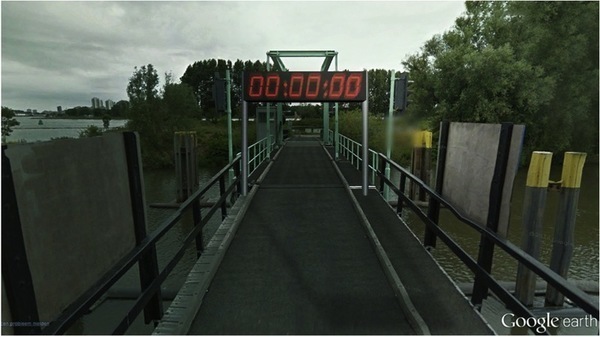
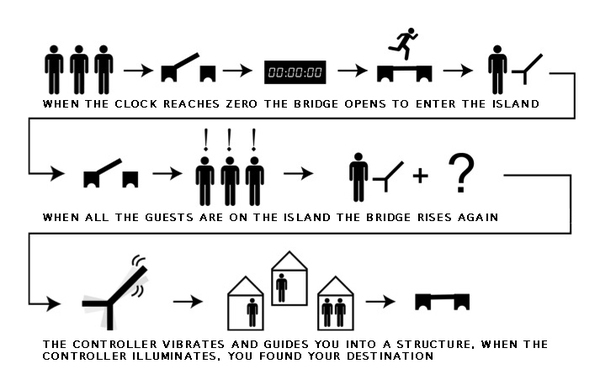
Time’s ticking away slowly. When the clock reaches “00:00:00”, the bridge will opens and the participants can enter the island. Once they’ve all entered, the bridge rises again, so that no one can leave the island. The game begins!
At the beginning each participant can obtain a controller. The controller will ask you several questions about the island; Once you have given an answer to all these questions the controller will lead you to a place on the island by using vibrations. When the controller lights up, you’ve reached your goal. Here you will meet other participants. For this kick-off different structures will built on the island as a metaphor for different kinds of doubts. Physical dynamic structures that changes form to accommodate different kinds of doubt.
Step 3: Programming essential themes
Within this year of doubt, we will look at doubts that we think are or should be important;
Economy
We’ve all experienced what the consequences of not doubting within economics have caused our society. For example bankers not doubting themselves and bankers not doubting each other, causing our society to shake on it's foundations. Together with economic experts we question modern day economics, to obtain new insights. Themes could be: value, sharing, scarcity and income inequality. In order to do so, there will be various activities like workshops and games, that will make us empathize with different social/economic roles, make us gain insight in economic systems and make us think of new possibilities within economics.
Ecology
The van Brienenoord-eiland’s nature might be beautiful, but it’s also very much disturbed by the city’s industry; the ground looks grayish, the ponds have minimal current, the flora isn’t very vital and you can see it’s soil is polluted because of the many blackberry-bushes trying to heal it. There’s no doubt our society has environmental issues; Is there for example a way we can cleanse this island and also win insights how to change our society’s ecology? Can we use the eco-systems that are present on this island to do so? Or do we need elements from outside the island? Together with van Brienenoord-eiland’s own forester and various ecologists we will rethink the ecology of our society.
Relations
When you think about doubt in relation to relationships, you ought to think there’s something wrong. But because of it’s reflective function, doubt can be very powerful within this context. In order for relationships to grow and strengthen, you will very much need it. Expressing your doubts within any kind of relation can be hard, it can result in very emotional situations. Can accepting doubt make expressing and receiving doubts more bearable?
Science
There’s been a lot of scientific research by different scientists on similar subjects, with different outcomes. This makes us non-scientists who expect science to be the truth doubt if it is. Is this expectation always realistic? There’s no doubt scientists strive for certainty and answers, but the road towards it must be full of doubt. We think scientists and non-scientist should get together and doubt about what science is and what to expect from it.
Business Model
In order to develop towards an autonomous think-, make- and workplace for and about the future of the city we need a business plan. As guidelines for this future plan, the masterclas came up with the following ideas:
- Extreme cost-reduction: no alarm, no insurance, no electricity, etc.
- For the exploitation budget, not to be dependent on external funders. We can make profit from renting the location to external parties
- The office can be ran by a limited amount of people
- “Artist/writer/thinker in residence”-program: in exchange for rent these people can work/live on the island
- For the cultural an substantive program we will request cultural subsidies and/or fundings
- Develop our own products, that create a modest amount of money
- To function as a breeding place for new civic entrepreneurs; start-ups have a lasting investment in the island
- Summer-weekends with catering
Doubters inc.[3] consist of the following participants:
- Carli Schenkeveld (lifestyle)
- Otske Pennin (spatial design)
- Gabriëlla Meijer (fine art)
- Kai Chung Ip
- Lou Muuse (lifestyle)
- Jessica Hammarlund Bergmann
- Maurice Specht (developer & clubhouse owner)
- Wessel van den Berge(graphic design)
- Dennis Wuisman (graphic design)
- Maarten van Blokland (TU)
- Isaac Monté
- Liza Koch (lifestyle)
- Natascha Goed (product design)
- Tabo Goudswaard
- Sabrina Lindemann
- Miek Walda (entrepreneur)
- Hanako Lodder (esoteric feng shui expert)
The masterclass was hosted and guided by Isaac Monté (Sweatshop Deluxe) and Maurice Specht (De Makers van Rotterdam) and organised and guided by Jessica Bergmann (Pink Pony Express).
Location: Clubhouse “De Arend en de Zeemeeuw”, Eiland Van Brienenoord 5 (Van Brienenoord Island), Rotterdam.
Sweatshop Deluxe is a Rotterdam-based design label with its own production workshops. The label provides young designers an opportunity to manufacture their designs. Sweatshop Deluxe stands for Design with a capital D, manufactured according to social principles. Each Sweatshop Deluxe product is unique: hand-made, in limited editions, and designed by promising young designers. The products are manufactured by people who are otherwise unable, for a variety of reasons, to participate in the regular labour market. Sweatshop Deluxe uses wherever possible sustainable or recycled materials.
